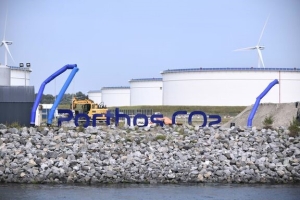


(Posted on 08/09/24)
Construction of the Porthos CCS (carbon capture and storage) project in the port area of Rotterdam is well underway. It is the first CO2 transport and storage project of this scale in the European Union to be realised. Porthos is the start of much more, it’s laying the foundations for future CCS projects in north-west Europe.
The construction of Porthos was celebrated with those directly involved. The Mayor of Rotterdam, Ahmed Aboutaleb, the Minister of Climate Policy and Green Growth, Sophie Hermans and Deputy Director-General from the European Commission for Energy, Mechthild Wörsdörfer opened the event together with the CEOs of Porthos’ shareholders Gasunie, EBN (Energie Beheer Nederland) and the Port of Rotterdam. Minister Hermans: “CCS is crucial to meet climate targets. By building the first large-scale transport and storage system for CO2 in the Netherlands, Porthos is taking a big step. This will allow the industry to reduce emissions and keep a competitive industry here in the Netherlands. I am proud of all the parties who are making this possible.”
Porthos is building an infrastructure to transport CO2 from industry in the port of Rotterdam to depleted gas fields under the North Sea. Porthos customers Shell, ExxonMobil, Air Liquide and Air Products will supply CO2 to an open-access pipeline running through the Rotterdam port area. The CO2 will be transported via an offshore pipeline to an existing platform in the North Sea, approximately 20 kilometres off the coast. From this platform, the CO2 will be pumped into depleted gas fields. The depleted gas fields are located in a sealed reservoir of porous sandstone more than 3 kilometres beneath the North Sea. Porthos has been recognised by the European Union as a project of common interest and has been awarded €102 million from the Connecting Europe Facility.
CO2 storage within the Porthos project can bridge the time needed for industry to switch from fossil fuels to low- or zero-carbon alternatives. The construction of the Porthos onshore open access pipeline marks the start of the development of a future CO2 network in Northwest Europe. While Porthos will transport 2.5 million tonnes per year, the onshore Porthos pipeline is ready for 10 million tonnes, so it can also supply CO2 to future projects like Aramis. The compressor station is also ready for expansion. It forms the heart of the future CO2 hub, to which also CO2next can be connected. This liquid CO2 terminal will be able to receive and deliver liquid CO2 by ship for customers not connected to a pipeline.
These projects in Rotterdam form the beginning of a CCS chain that can develop into an international CCS network with the Delta Rhine Corridor and other links. The development of Rotterdam as a CO2 hub contributes to the European CCS policy as set out in the Industrial Carbon Management Strategy (ICMS) and the Net Zero Industry Act (NZIA). In combination with technologies such as Direct Air Capture (DAC) and Bioenergy CO2 Capture and Storage (BECCS), the network could contribute to reaching negative emissions in the future. CO2 is currently used in greenhouse horticulture and future demand is expected for CO2 as a feedstock, for the production of synthetic fuels and for closed-loop processes.
Boudewijn Siemons, CEO of the Port of Rotterdam: "This project is an important contribution to the goal of a 55% reduction in CO2 emissions in the Rotterdam port area by 2030 and a CO2-neutral port by 2050. It is the start of a CO2 infrastructure in the port that will enable future CO2 storage projects to reduce CO2 emissions and projects to use CO2 as a feedstock. As a European energy port, we are facilitating the development of CO2 infrastructure and connections with neighbouring countries to enable the reduction of CO2
With this year’s Rail Conference “Rail Freight Transport and Seaports”, a joint initiative... Read more
Asian Bulk Logistics (ABL Group) and ICG have jointly announced the successful completion of ABL&rsquo... Read more
Abu Dhabi based AD Ports Group, a leading global enabler of integrated trade, industry and logistics... Read more
The Executive Board of Hamburger Hafen und Logistik AG (HHLA) has appointed Patrick Krawutschke as Managing... Read more
Abu Dhabi based AD Ports Group, a global enabler of integrated trade, transport, industry, and logistics... Read more
This year marks a significant milestone in maritime innovation as Port Hedland, Australia, celebrates... Read more
Associated British Ports (ABP), the UK’s leading port operator, has announced the latest tranche... Read more
During the Investment, Labour, and Trade Promotion Programme in Japan (November 16–22, 2025),... Read more
AD Ports Group subsidiary Khalifa Economic Zones Abu Dhabi - KEZAD Group, the largest operator of integrated... Read more
Abu Dhabi based AD Ports Group, a global enabler of integrated trade, transport, industry, and logistics... Read more